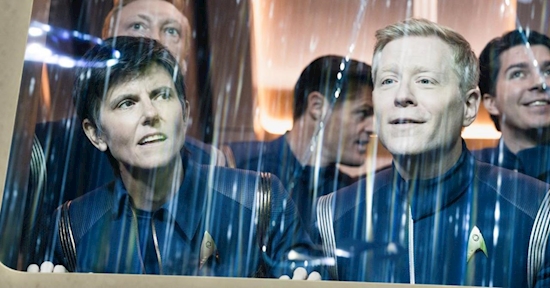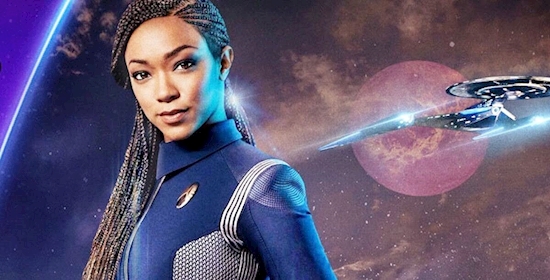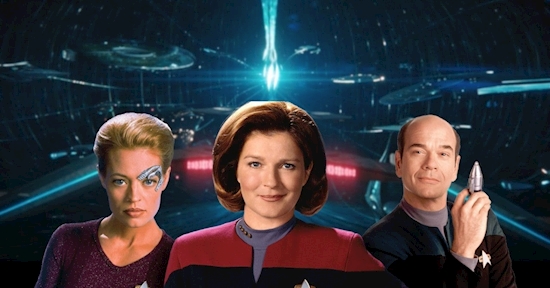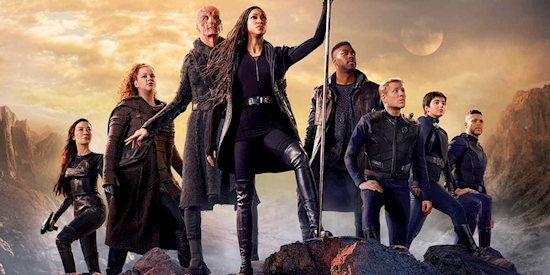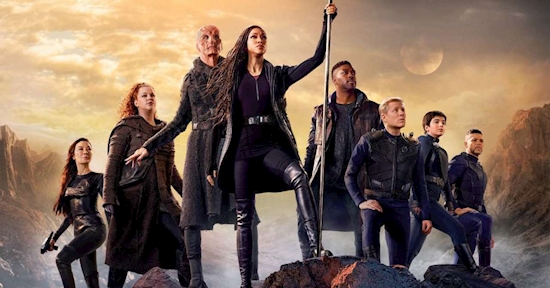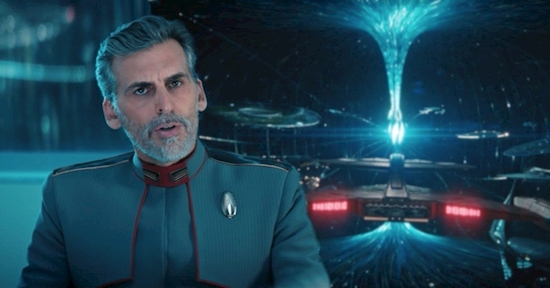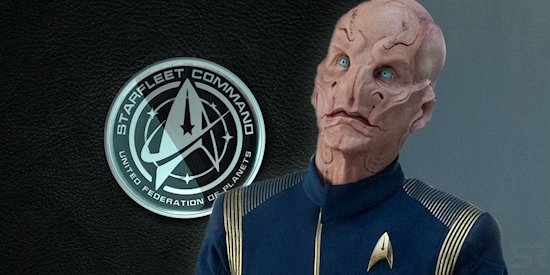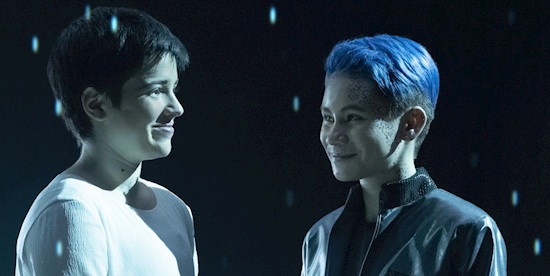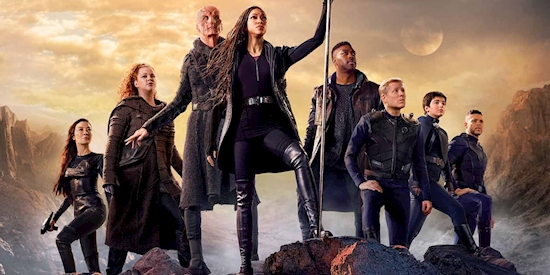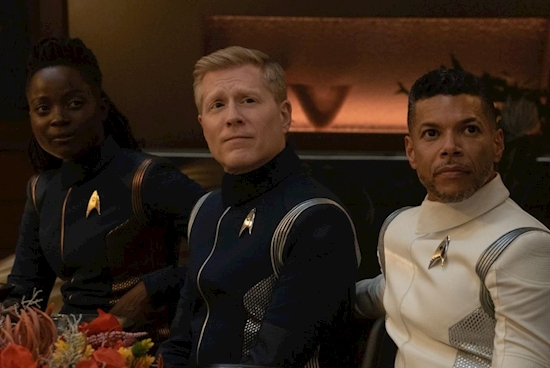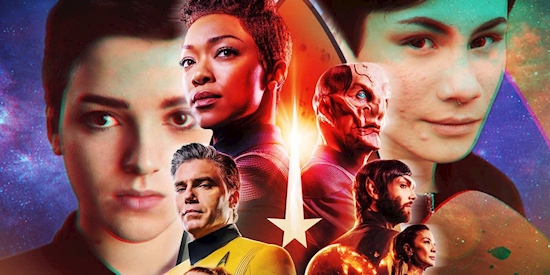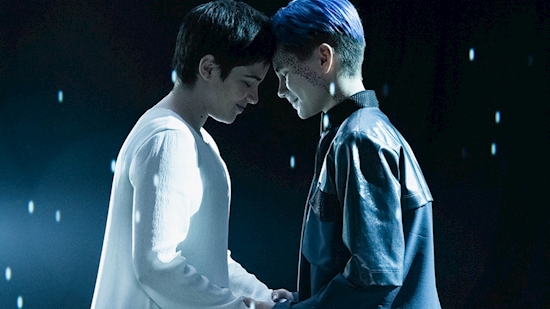Star Trek: Discovery – CBS All-Access flagship series now the franchise torchbearer
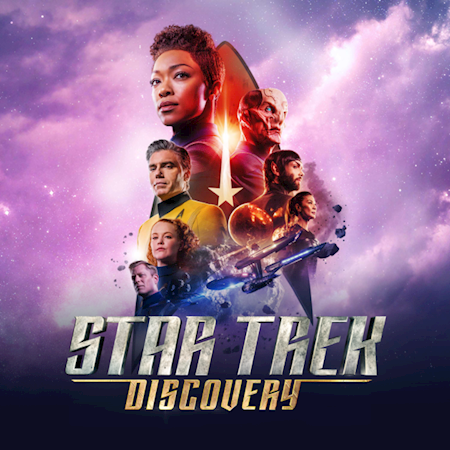 Any analysis of the newest Star Trek television series to come down the pike in 12 years will tend to focus on the similarities and differences of what came before. Such thinking does something of a disservice to Star Trek: Discovery, an utterly unprecedented sixth spinoff after The Original Series. Though Star Trek: The Next Generation and Deep Space Nine revolutionized television, Discovery chases Enterprise with a gap of 12 years of evolution to television presentation in between.
Any analysis of the newest Star Trek television series to come down the pike in 12 years will tend to focus on the similarities and differences of what came before. Such thinking does something of a disservice to Star Trek: Discovery, an utterly unprecedented sixth spinoff after The Original Series. Though Star Trek: The Next Generation and Deep Space Nine revolutionized television, Discovery chases Enterprise with a gap of 12 years of evolution to television presentation in between.
A single viewing makes clear (at least to viewers in the late 2010s) that Enterprise’s debut pair of episodes “Vulcan Hello” and “Battle at the Binary Stars” has the (perhaps cynical but pragmatic regardless) dual purpose of introducing viewers to plot and characters but also to CBS’s new online-only format for the program’s distribution.
What’s new and what’s old
What’s new: A seriously massive special effects budget, for one. Episodes cost up to $8.5 million per on production and, wow, maybe 15 minutes of Discovery’s premiere story have passed before it’s easily acknowledgeable as tops among Star Trek series in this regard.
Star Trek: Discovery Reveals Key Change to Starfleet's Mission
Source: comicbook.comDiscovery's DS9 & Voyager References Make It Star Trek's Biggest Show
Source: screenrant.comDiscovery Season 3 Has Learned From Star Trek's TNG Success
Source: screenrant.comStar Trek: Discovery Reveals The State Of Starfleet In The 32nd Century
Source: wegotthiscovered.comStar Trek: Discovery Reveals a Fun Voyager Cameo
Source: comicbook.comStar Trek: Discovery Reveals The Mirror Universe's 32nd Century
Source: screenrant.comStar Trek Discovery pays tribute to Deep Space Nine Nog Actor
Source: io9.gizmodo.comStar Trek Discovery Has A Touching Deep Space Nine Actor Tribute
Source: screenrant.comStar Trek: Discovery Says Goodbye to Fan-Favorite Crew Member
Source: comicbook.comStar Trek Discovery: Every Starfleet & Federation Change In The 32nd Century
Source: screenrant.comStar Trek: Discovery Loses a Crew Member
Source: cbr.comStar Trek: Discovery Reveals The New Future Starfleet And Its Admiral
Source: comicbook.comStar Trek Discovery Season 3 Episode 5: New Starfleet Officers Cast Guide
Source: screenrant.comStar Trek Discovery Season 3's Future Voyager Ship Cameo Explained
Source: screenrant.comStar Trek Theory: How Adira Can Talk To Gray
Source: screenrant.comStar Trek: Discovery Season 3's DOT-7 Wall-E Robots Explained
Source: screenrant.comStar Trek: The Crew of the Discovery Has a New Mantra
Source: cbr.comStar Trek: Discovery Cast Discusses the Crew's Messy Family Dynamic
Source: comicbook.comBurnham's New Skills Are Already Coming in Handy
Source: cbr.comStar Trek: Discovery Debuts GLAAD Collection Merch
Source: cbr.com'Star Trek: Discovery' Delivers Mixed Results on Trans Rep
Source: themarysue.comBut beyond the superficial trappings of uniforms and as-yet unmet species or three, much of Discovery is just good ol’ Star Trek adapted for the 21st century. The title theme harkens back to the original series with direct samples for that original tune. The opening credits graphics show (and the episodes play out) much emphasis on the big two of Star Trek lore: The Vulcans and Klingons. And while the Klingons have undergone their third major makeover since the days of Kirk’s original five-year mission, those Vulcans don’t change a bit – even Spock and his father Sarek crosses over into Discovery.
And despite the fact that Discovery is supposed to be set 10 years or so before the events of the *TV* version of Captain Kirk’s era – and not the reboot movie universe version – the bridge of the Shenzhou has plenty of lens flares firing…
Crew members – of the Shenzhou, Discovery and Enterprise
Commander Michael Burnham (Sonequa Martin-Green) – A compelling character who is more or less the focus of the series. Raised by Sarek and Amanda, parents of Spock, is notably the only Starfleet officer ever to mutiny (Really?) but gets a shot at redemption when Captain Lorca recruits her to join the Discovery crew in the Klingon-Federation war that, as she is unfairly accused, she started. (Of course, the Federation types don’t know the inner workings of Klingon politics and the dogma of T’Kuvma…) In very little screen time, Burnham becomes the most compelling human character this franchise has seen since, what, Jean-Luc Picard, maybe…
Captain Philippa Georgiou (Michelle Yeoh) – Georgiou is the first Starfleet captain we meet in Discovery, and quickly proves to be a cunning tactician, martial arts expert and first-contact specialist (until the Klingons show up, that is). This intrepid captain is apparently to badass to live long and is dispatched shockingly early in season 1. Mirror Universe (and Burnahm) to the rescue! Season 1’s shenanigans in the parallel ’verse result in the emigration of EEEEvil Georgiou to the prime ST universe, where she kicked enough metaphorical butt to earn her own series.
Captain Gabriel Lorca (Jason Isaacs) – Captain Lorca comes off as a strange character from the moment Burnham crosses his path in “context is for Kings.” As it turns out, Lorca’s erratic behavior – and his particular interest in recruiting Burnaham has distinctly insidious un-Federation motivations.
Captain Christopher Pike (Anson Mount) – Talk about your reboots: The character of Captain Pike has gone from the TOS pilot episode to the two-parter “The Menagerie” to the 2009 movie to Discovery, and in no series has he been given more quality time, quality dialogue and quality action. STG would guess that the majority of Millennials, for whom Discovery is their first currently-running ST series, call Pike their favorite captain. And damn, he’s heroic.
First Officer Commander Saru (Doug Jones) – Saru is a Kelpian, a prey species from a world fostering at least two intelligent species. Saru has a long history with Burnham, having served with her for years aboard the USS Shenzhou. Their rocky relationship based in the death of Captain Georgiou is ironed out by the end of season 1, and fascinating facts about Saru and his people are introduced in the first volume of Short Treks and in Discovery season 2. In terms of fandom, this dude is definitely the Spock/Data figure on this show.
Science Officer Spock (Ethan Peck). You’ve probably heard of this character before.
Number One, a.k.a. Una (Rebecca Romijn) – As Riker is to Picard, “Number One” is to Pike aboard the Enterprise. This Spartanly-named character gets her chance to shine in a fleshed-out role in Discovery after playing a Spock-like straight man in the TOS pilot; heck, Pike even drops her name once.
Lt. Paul Stamets, science officer (Anthony Rapp) – Stamets is a man born ahead of his time – not just because of his insanely advanced philosophies of biophysics in general and astromycology. By default, he ends up piloting the Discovery’s super high-tech spore drive and, thanks to his experience in the galactic mycelial web, he now enjoys a “special relationship with time” that’s nearly as powerful as his special relationship with sarcasm.
Dr. Hugh Culber, chief medical officer (Wilson Cruz) – Unfortunately for Star Trek fans, what is usually one of the best characters on any Star Trek series has been reduced to a plot device, i.e. to serve as Stamets’s love interest and take him on a rollercoaster of maudlin emotions.
Lt. Ash Tyler (Shazad Latif) – Lorca recruited Tyler for the cause after the two did a little hard time together under the not-so-gentle ministrations of Klingon captors in “Choose Your Pain.” Unfortunately, Tyler brings quite an extraordinary condition along with him which first appears to be PTSD but turns out a hell of a lot weirder – and more dangerous.
Ensign Sylvia Tilly (Mary Wiseman) – A enthusiastic go-getter with an undying love of mathematics and absolutely fantastic hair, young Sylvia Tilly believes that she’ll someday rise to the rank of captain. She’s certainly got the brains to do so, as her outstanding work in theoretical engineering (!) at Starfleet Academy got her fast-tracked to Discovery.
Key Klingon characters in Star Trek: Discovery season one
It would be a disservice to Star Trek: Discovery to write up any sort of character list without including the Klingon characters who take up a sizable fraction of screen time throughout the first season. Some minor spoilers ahead because, hey, oftentimes it’s impossible to talk about Klingons without breaking out the scorecard of who-killed-whom…
T’Kuvma – One of the key figures in Klingon history, T’Kuvma is credited with the invention of cloaking technology, which he offered to distribute throughout the Klingon Empire. However, T’Kuvma seeks to share his technology only if the 24 feuding houses come together as one force against those who promise “we come in peace”, i.e. the Federation. After killing Georgiou, T’Kuvma dies somewhat ignobly as he’s shot in the back by Burnham but is imoortalized is Klingon lore from the 22nd century on.
Voq – An albino, outcast and “son of none”, Voq became the righthand man (“torchbearer” in Klingon custom) of T’Kuvma right around the time of T’Kuvma’s attempted reunification of the Klingon houses. After T’Kuvma’s death, Voq assumed control of the House of T’Kuvma, but did not hold these reigns of power for long. Once his life was spared by Kol, Voq got to work and gaining revenge and taking control of the Klingon Empire to lead in the fashion of T’Kuvma and the great Kahless.
L’Rell was a member of the House of T’Kuvma who served as Voq’s torchbearer despite getting passed over for the top-dog spot by T’Kuvma himself. L’Rell remains Voq’s last ally and comes through in the clutch for the most marginalized Klingon until Mogh would become a household name...
Kol – Representing the House of Kor, that long-lived warrior who’d appear in The Originial Series and Deep Space Nine, among T’Kuvma’s discussion, Kol comes around to the reunification plan, but doesn’t necessarily trust the leader. Proclaiming that weak leadership will only lead to yet another dissolution of peace among Klingon houses, Kol sets out to not only lead the Klingons to a glorious victory in a war against the Federation, but to continue ruling the Empire thereafter with an iron fist. Geez, no wonder they rallied around this dude: After all, that sounds like proper Klingon rhetoric.

